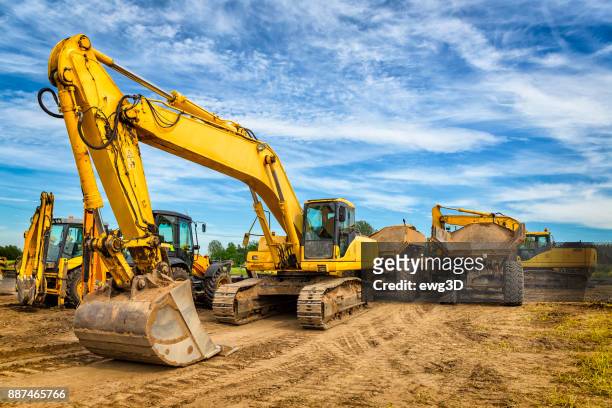Vital Tips for Handling Heavy Tools Rental Contracts and Logistics Properly
Efficiently handling heavy equipment rental contracts and logistics is important for the success of any type of job that relies on these sources. A complete understanding of rental terms, combined with accurate assessment of equipment needs, lays the structure for positive settlements.
Understand Rental Terms
Recognizing rental terms is crucial for successful heavy devices monitoring. The rental period defines the timeframe for which the tools is leased, influencing budgeting and job timelines.
In addition, it is important to understand the upkeep commitments outlined in the contract. Normally, rental firms keep the equipment, but comprehending that is accountable for routine checks and fixings is essential to stop operational disruptions. Furthermore, terms may consist of stipulations worrying obligation for problems or theft, which can have significant economic effects otherwise appropriately recognized.

Assess Devices Needs
Analyzing tools requirements is a vital step for any type of job supervisor aiming to maximize resource allotment and improve functional effectiveness. This procedure includes a detailed analysis of the task requirements, consisting of details tasks, timelines, and the kind of devices required to attain desired results.
Begin by recognizing the extent of the task and the tasks that will be executed. Take into consideration elements such as the surface, the range of procedures, and any possible obstacles that could influence devices selection. Involving with employee that will certainly run the equipment can give important understandings into useful demands and preferences.

Next, examine the capability and abilities of offered devices alternatives. It is necessary to match the right tools to the jobs at hand, making sure that it can manage the anticipated work without compromising safety and security or efficiency.
Furthermore, variable in the rental duration and frequency of usage. Understanding these elements can help identify whether renting or acquiring is the most affordable service. By performing an extensive assessment of tools requirements, job managers can make informed decisions that result in improved productivity and lowered functional costs.
Negotiate Properly
When the devices demands are clearly recognized, the next step entails effective arrangement with rental business to safeguard favorable terms. Begin by looking into different rental business to recognize their pricing frameworks, supply schedule, and credibility.
When coming close to the settlement table, be clear regarding your needs, including the type of tools, rental period, and any type of additional services you may need. This openness enables rental business to supply tailored services that can fulfill your this specific needs (dozer rental). Don't hesitate to request discount rates, particularly for lasting rentals or mass orders, as numerous companies want to provide giving ins to safeguard larger agreements
These aspects can significantly impact the overall price and should be explicitly detailed in the rental arrangement. Ensure that all agreed-upon terms are documented in writing to prevent misunderstandings and protect your rate of interests throughout the rental period.
Coordinate Transportation Logistics
Coordinating transportation logistics is a crucial element of handling heavy equipment rental arrangements. Effective transport guarantees that equipment is delivered in a timely manner and in ideal problem, thus lessening downtime and improving project performance. To attain this, it is vital to develop a thorough logistics plan that describes the whole transportation procedure from pick-up to delivery.
Begin by analyzing the specific transportation needs based on the kind and size of the tools entailed - rental company near me. Involve with reliable transport carriers who focus on heavy tools to ensure they have the necessary know-how and tools, such as flatbed vehicles or specialized trailers. Talk about aspects such as weight limitations, course limitations, and required authorizations to stay clear of unexpected delays
Moreover, preserve open communication with both the rental business and the transport provider to work with timetables efficiently. Confirm all information, consisting of pick-up and drop-off times, to make certain everybody is aligned and prepared. Develop backup strategies to address any prospective disturbances, such as adverse climate or website traffic problems, which may affect the transportation timeline. By meticulously collaborating transportation logistics, you can promote the integrity of your rental contract and facilitate smooth project implementation.
Prepare For Maintenance and Assistance
Moreover, it is essential to communicate straight with the rental copyright relating to maintenance responsibilities. Some agreements may consist of upkeep as component of the rental service, while in various other instances, the obligation might fall on the tenant. Recognizing these terms will assist avoid unforeseen costs and liabilities.
Furthermore, having access to technical support can be vital. Make sure that the rental company supplies 24/7 assistance or an emergency navigate to this site contact, enabling quick resolution of any type of tools problems. Educating your team on correct equipment usage and routine checks can additionally substantially boost functional effectiveness.
Verdict
In final thought, reliable monitoring of hefty tools rental arrangements and logistics rest on a complete understanding of rental terms, precise assessment of devices demands, and proficient settlement skills. Working with transportation logistics and preparing for upkeep additionally enhance functional efficiency. By implementing these strategies, companies can mitigate threats, control costs, and make sure that jobs proceed efficiently and within well established timelines. Emphasizing clear communication with all stakeholders remains critical in navigating the intricacies of devices the original source service and logistics administration.
Properly managing heavy tools rental agreements and logistics is vital for the success of any type of job that relies on these resources. By completely assessing and recognizing these rental terms, organizations can make enlightened decisions, mitigate dangers, and make sure that their hefty tools administration aligns with task objectives and monetary restraints.Coordinating transportation logistics is a crucial element of managing heavy equipment rental arrangements.In verdict, reliable administration of heavy equipment rental agreements and logistics hinges on a comprehensive understanding of rental terms, accurate evaluation of devices needs, and proficient arrangement abilities. Highlighting clear interaction with all stakeholders continues to be critical in navigating the intricacies of devices leasing and logistics management.